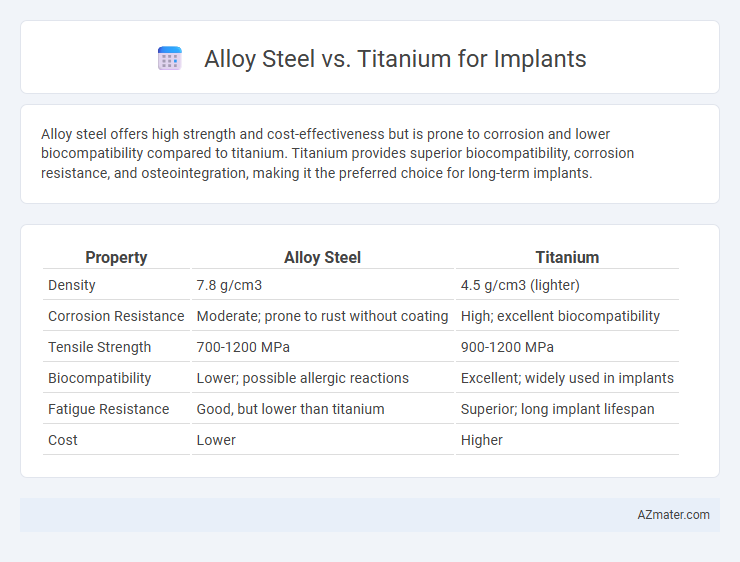Alloy steel offers high strength and cost-effectiveness but is prone to corrosion and lower biocompatibility compared to titanium. Titanium provides superior biocompatibility, corrosion resistance, and osteointegration, making it the preferred choice for long-term implants.
Table of Comparison
| Property | Alloy Steel | Titanium |
|---|---|---|
| Density | 7.8 g/cm3 | 4.5 g/cm3 (lighter) |
| Corrosion Resistance | Moderate; prone to rust without coating | High; excellent biocompatibility |
| Tensile Strength | 700-1200 MPa | 900-1200 MPa |
| Biocompatibility | Lower; possible allergic reactions | Excellent; widely used in implants |
| Fatigue Resistance | Good, but lower than titanium | Superior; long implant lifespan |
| Cost | Lower | Higher |
Introduction to Implant Materials: Alloy Steel vs Titanium
Alloy steel and titanium are prominent materials in implant manufacturing due to their mechanical strength and biocompatibility. Alloy steel offers high tensile strength and durability but may pose corrosion risks in biological environments. Titanium exhibits superior corrosion resistance, excellent osseointegration, and lightweight properties, making it optimal for long-term implants.
Chemical Composition and Structure
Alloy steel implants typically contain iron, carbon, chromium, nickel, and molybdenum, providing high strength and corrosion resistance through a body-centered cubic (BCC) or face-centered cubic (FCC) crystal structure. Titanium implants feature a predominantly hexagonal close-packed (HCP) alpha phase and some beta phase with aluminum and vanadium as primary alloying elements, offering superior biocompatibility and lower density. The chemical composition of titanium alloys reduces allergic reactions and promotes osseointegration, whereas alloy steel's higher carbon content can increase rigidity but may pose biocompatibility challenges.
Biocompatibility and Tissue Response
Alloy steel implants exhibit moderate biocompatibility but may induce allergic reactions or corrosion-related issues affecting tissue health. Titanium demonstrates superior biocompatibility with excellent corrosion resistance, promoting osseointegration and minimal inflammatory response in surrounding tissues. Clinical studies confirm titanium implants support faster healing and longer-term stability compared to alloy steel alternatives.
Mechanical Properties and Strength
Alloy steel offers high tensile strength and excellent wear resistance, making it suitable for load-bearing implants requiring durability. Titanium exhibits superior biocompatibility and corrosion resistance with a high strength-to-weight ratio, ideal for long-term implantation and osseointegration. Mechanical properties favor titanium for lightweight, fatigue-resistant implants, while alloy steel provides enhanced hardness and impact resistance.
Corrosion Resistance in Biological Environments
Titanium exhibits superior corrosion resistance in biological environments compared to alloy steel due to the formation of a stable titanium oxide layer that prevents ion release and metal degradation. Alloy steel, although strong, is more susceptible to corrosion from bodily fluids, which can lead to metal ion leaching and potential inflammatory responses. The biocompatibility of titanium makes it the preferred choice for implants requiring long-term durability and minimal immune reaction.
Longevity and Implant Lifespan
Alloy steel implants offer high strength and corrosion resistance but may experience fatigue and wear over time, potentially reducing implant lifespan. Titanium implants provide superior biocompatibility, corrosion resistance, and fatigue strength, resulting in longer-lasting implants with enhanced integration into bone tissue. Studies show titanium implants generally outlast alloy steel counterparts, making them preferable for applications demanding extended implant longevity.
Weight and Density Comparison
Alloy steel used in implants typically has a density of around 7.7 to 8.1 g/cm3, making it significantly heavier compared to titanium, which has a density of approximately 4.5 g/cm3. The lower density of titanium results in implants that are substantially lighter, reducing patient discomfort and improving mobility. Weight optimization in implants is crucial for long-term success, making titanium a preferred choice due to its favorable strength-to-weight ratio.
Cost and Availability Analysis
Alloy steel implants offer a cost-effective solution with widespread availability due to established manufacturing processes and abundant raw materials. Titanium implants, while significantly more expensive, provide superior biocompatibility and corrosion resistance, making them preferred for long-term use despite limited availability in some regions. The choice between alloy steel and titanium largely depends on budget constraints and the specific medical requirements of the implant.
Clinical Applications and Case Studies
Alloy steel offers high strength and cost-effectiveness, making it suitable for load-bearing orthopedic implants, but concerns about corrosion and biocompatibility limit its use in long-term applications. Titanium is preferred in clinical applications due to its superior biocompatibility, corrosion resistance, and osseointegration properties, as demonstrated in numerous case studies involving dental, spinal, and joint implants. Clinical evidence consistently shows titanium implants result in lower rejection rates and improved patient outcomes compared to alloy steel counterparts.
Final Recommendation for Medical Implants
Titanium outperforms alloy steel for medical implants due to its superior biocompatibility, corrosion resistance, and lower density, which reduces implant weight and promotes better patient comfort. Alloy steel, despite its strength and cost-effectiveness, presents higher risks of allergic reactions and corrosion in the body, potentially compromising implant longevity and safety. Medical experts recommend titanium as the preferred material for implants, especially in load-bearing and long-term applications, to ensure optimal performance and patient outcomes.

Infographic: Alloy steel vs Titanium for Implant
 azmater.com
azmater.com